情态动词考点例析
情态动词考点解析

项 形式
目
用法
情 态 动 词 + be + 对 现 在 的 情 况 或 状
1 adj. / n.
态 的推 测
情 态 动 词 + be 对 正在 进行 的动 作
2
Hale Waihona Puke doing进 行推 测
3 情 态 动 词+ have 对 过 去 发 生 的 事 实
done
或 状态 的推 测
4 情 态动 词+ v.
对 将来 发生 的事 实 或 状态 的推 测
例 1: He must be very angry with you. 他 一定 很生 你的 气。
Mary can’t be at work now. I saw her having a tennis match just now. 玛 莉 不 可 能 正 在 工 作 。 我刚 才 还 看 到 她 参 加 网 球 比 赛 呢。
will / would 表示 推 测多 用 二、 三 人称 , 其 中 would 比 will 的 可 能 性 小 ; should / ought to 表示 推 测多 用于 肯 定句 中 , 表 示 推 理 “应该 、会 ”。例 如:
情态动词详解+例句

情态动词详解 +例句一、单项选择情态动词1.No driving after drinking is a rule that every driverC .may 【答案】 B【解析】2.-- Did Jim come?A . wil lB . shall 试题分析:考察情态动词。
A.将要B 将要C 可能 D.可以。
Will 表示请求、建议、意志、愿望和决心。
Shall 用于第二、第三人称,表示说话人给对话的命令、 May 表示请求和允许;用于祈使句表示决心;表示推测、可能性。
允许。
句意:酒后驾车是每一位驾车者在我们国家应当遵守的规则。
考点:考察情态动词 警告、允诺或威胁。
Can 表示能力;请求和 故选 B 。
obey in our country.D . can-- I don ' t know. He A . might have come C . must have come while I was out.B .might come D . should have come解析】【详解】 考查情态动词推测用法。
句意: Jim 来了吗? --我不知道,在我不在的时候,可能来过。
根 据前文I don ' t kno 可知,说话者不知道 Jim 来没来,因此后文推测来过,但是语气很不确 定,故可知选 A 。
对过去情况的推测为情态动词+have done , must have done —定做了某事, should have done 应该来过,不符合,故选 【点睛】A 。
情态动词+have+过去分词的用法,表示推测或判断过去的情况。
can/could+have+ 过去分词用法: ① 多用于否定句和疑问句中。
表示对过去某事发生的可能 性的否定或质疑,意为:不可能(已经) ............................. 了-(否定句) /可能(已经) 了嘛?-(疑 问句) ② 用于肯定句中。
复习专题情态动词考点+例题_全面解析
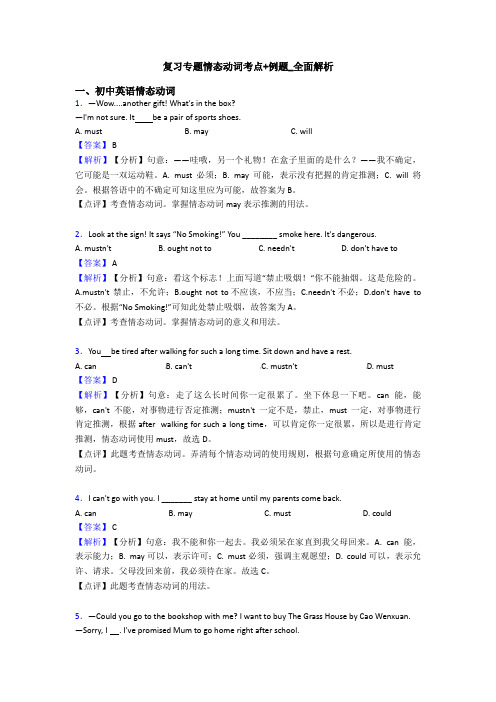
复习专题情态动词考点+例题_全面解析一、初中英语情态动词1.—Wow....another gift! What's in the box?—I'm not sure. It be a pair of sports shoes.A. mustB. mayC. will【答案】 B【解析】【分析】句意:——哇哦,另一个礼物!在盒子里面的是什么?——我不确定,它可能是一双运动鞋。
A. must必须;B. may可能,表示没有把握的肯定推测;C. will将会。
根据答语中的不确定可知这里应为可能,故答案为B。
【点评】考查情态动词。
掌握情态动词may表示推测的用法。
2.Look at the sign! It says “No Smoking!” You ________ smoke here. It's dangerous.A. mustn'tB. ought not toC. needn'tD. don't have to【答案】 A【解析】【分析】句意:看这个标志!上面写道“禁止吸烟!“你不能抽烟。
这是危险的。
A.mustn't 禁止,不允许;B.ought not to不应该,不应当;C.needn't不必;D.don't have to 不必。
根据“No Smoking!”可知此处禁止吸烟,故答案为A。
【点评】考查情态动词。
掌握情态动词的意义和用法。
3.You be tired after walking for such a long time. Sit down and have a rest.A. canB. can'tC. mustn'tD. must【答案】 D【解析】【分析】句意:走了这么长时间你一定很累了。
坐下休息一下吧。
can能,能够,can't不能,对事物进行否定推测;mustn't一定不是,禁止,must一定,对事物进行肯定推测,根据after walking for such a long time,可以肯定你一定很累,所以是进行肯定推测,情态动词使用must,故选D。
情态动词的语法特征以及5大考点
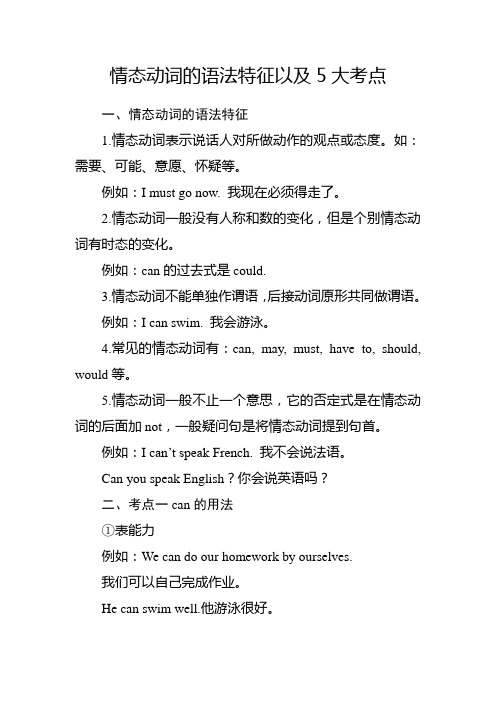
情态动词的语法特征以及5大考点一、情态动词的语法特征1.情态动词表示说话人对所做动作的观点或态度。
如:需要、可能、意愿、怀疑等。
例如:I must go now. 我现在必须得走了。
2.情态动词一般没有人称和数的变化,但是个别情态动词有时态的变化。
例如:can的过去式是could.3.情态动词不能单独作谓语,后接动词原形共同做谓语。
例如:I can swim. 我会游泳。
4.常见的情态动词有:can, may, must, have to, should, would等。
5.情态动词一般不止一个意思,它的否定式是在情态动词的后面加not,一般疑问句是将情态动词提到句首。
例如:I can’t speak French. 我不会说法语。
Can you speak English?你会说英语吗?二、考点一can的用法①表能力例如:We can do our homework by ourselves.我们可以自己完成作业。
He can swim well.他游泳很好。
I can play football but I can’t play the piano.我会踢足球但是我不会弹钢琴。
②表许可例如:You can watch TV after supper.晚饭后你可以看电视。
例如:You can’t play basketball in the street.你不能在街上打篮球。
③表请求例如:Can you help me with my math?你能帮我学数学吗?Could you lend your book to me?你能把你的书借给我吗?注意:could 是can的过去式,但是这里并不表示过去时,而是表示委婉语气。
④表示“不可能……”情态动词can的否定式,可以用来表示否定的推测,意为“不可能……”。
例如:That can’t be her father, because her father has gone to England.那人不可能是她爸爸,因为她爸爸已经去英国了。
7个情态动词5个考点,易混点

初中英语情态动词用法详解【情态动词知识梳理】情态动词有具体的词义,但也同助动词一样,需要与其他词语一起构成句子的谓语,另外情态动词没有人称和数的变化,情态动词后必须跟动词原形。
考点一:can,may,must等情态动词在陈述句中的用法:1. can的用法:(1).表示能力、许可、可能性。
表示能力时一般译为“能、会”,即有种能力,尤其是生来具备的能力,此时may和must均不可代替它。
如:She can swim fast, but I can’t . 她能游得很快,但我不能。
I can see with my eyes.我用眼睛看。
(2).表示许可,常在口语中。
如:You can use my dictionary. 你可以用我的字典。
(3).表示推测,意为“可能”,常用于否定句和疑问句中,此时can’t译为“不可能”。
如:Can the news be true?这个消息会是真的吗?—Can it be our teacher?那个人有可能是我们老师吗?—No, it can’t be our teacher. He is on a visit to the Great Wal l.不可能。
咱们老师正在游览长城呢。
【例题】—I think Miss Gao must be in the library. She said she would go there.—No. She __be there, I have just been there.【解析】根据下文“我刚去过那儿”可知,应为“不可能”,can’t表示推测[答案]2. could的用法:(1).can的过去式,意为“能、会”,表示过去的能力。
如:He could write poems when he was 10. 他十岁时就会写诗。
(2). could在疑问句中,表示委婉的语气,此时could没有过去式的意思。
如:Could you do me 你能帮我个忙吗?—Could I use your pen?我能用一下你的钢笔吗?—Yes, you can.可以。
透析中考英语语法情态动词考点
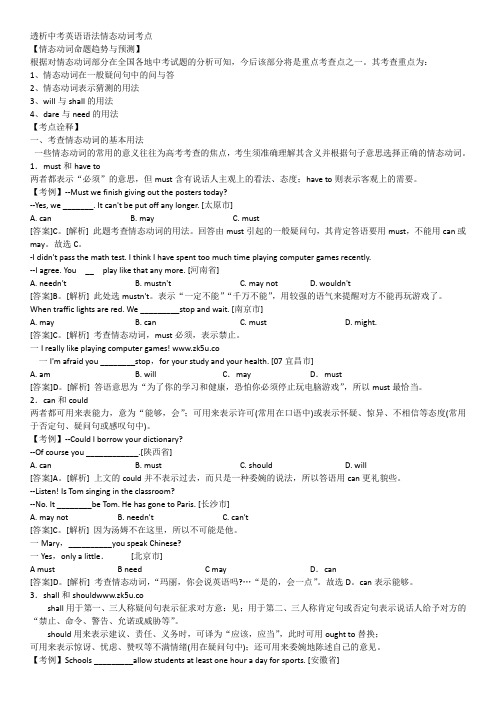
透析中考英语语法情态动词考点【情态动词命题趋势与预测】根据对情态动词部分在全国各地中考试题的分析可知,今后该部分将是重点考查点之一。
其考查重点为:1、情态动词在一般疑问句中的问与答2、情态动词表示猜测的用法3、will与shall的用法4、dare与need的用法【考点诠释】一、考查情态动词的基本用法一些情态动词的常用的意义往往为高考考查的焦点,考生须准确理解其含义并根据句子意思选择正确的情态动词。
1.must和have to两者都表示“必须”的意思,但must含有说话人主观上的看法、态度;have to则表示客观上的需要。
【考例】--Must we finish giving out the posters today?--Yes, we _______. It can't be put off any longer. [太原市]A. canB. mayC. must[答案]C。
[解析] 此题考查情态动词的用法。
回答由must引起的一般疑问句,其肯定答语要用must,不能用can或may。
故选C。
-I didn't pass the math test. I think I have spent too much time playing computer games recently.--I agree. You __ play like that any more. [河南省]A. needn'tB. mustn'tC. may notD. wouldn't[答案]B。
[解析] 此处选mustn't。
表示“一定不能”“千万不能”,用较强的语气来提醒对方不能再玩游戏了。
When traffic lights are red. We _________stop and wait. [南京市]A. mayB. canC. mustD. might.[答案]C。
情态动词考点例析

y u ln e y u ie o e d I o rbk ? n
— —
Ye . fc u s . r o r . s o o re He e y u a e
一
No y u , o
.
— —
A.mu t t sn’
B. n’ wo t
C.c n’ a t
D. e d t n e n’
【 简析】 m s引导的疑问句进行否定 回答时要用 nent故选 D项。 以 ut ed ’,
三、 考查情态动词表示许可的用法 .
m y cn cud a, a , ol 都可以用于一般疑问句 , 用来征求对方意见 , 求对方允许 . 请 意为 “ 以” 可 。肯
【 简析】 本题考查情态动词表推测 , 由前句“ 将近 7 点了” 推测“ 杰克一定回家了”故选 A琢。 ,
2一 Litn I m ign n t ec a so m? . se ! sTo sn i g i h ls r o
m
No t ,i
—
b m . a o o P rs e To He h sg net a ・ i
— — — — —
A. y n t ma o
B. e d t n e n’
C.c n’ a t
D. sn’ mu t t
2 0 年 1 2月 08 —
维普资讯
【 简析】 根据句意可知这是客观上的“ 必须”故选 A项。 ,
3. Mu tIsa th me a d tk ae o e ? 一 s ty a o n a ec r fh r
能不会” 。
【 典型考题 】
1 I’ e r e e ’lc . a k— — .tsn al sv no co k J c y
中考英语情态动词考点总结与归纳
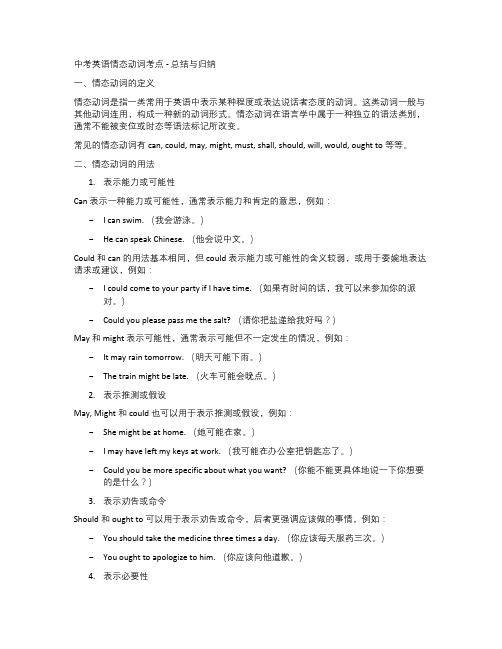
中考英语情态动词考点 - 总结与归纳一、情态动词的定义情态动词是指一类常用于英语中表示某种程度或表达说话者态度的动词。
这类动词一般与其他动词连用,构成一种新的动词形式。
情态动词在语言学中属于一种独立的语法类别,通常不能被变位或时态等语法标记所改变。
常见的情态动词有 can, could, may, might, must, shall, should, will, would, ought to 等等。
二、情态动词的用法1.表示能力或可能性Can 表示一种能力或可能性,通常表示能力和肯定的意思,例如:-I can swim. (我会游泳。
)-He can speak Chinese. (他会说中文。
)Could 和 can 的用法基本相同,但 could 表示能力或可能性的含义较弱,或用于委婉地表达请求或建议,例如:-I could come to your party if I have time. (如果有时间的话,我可以来参加你的派对。
)-Could you please pass me the salt? (请你把盐递给我好吗?)May 和 might 表示可能性,通常表示可能但不一定发生的情况,例如:-It may rain tomorrow. (明天可能下雨。
)-The train might be late. (火车可能会晚点。
)2.表示推测或假设May, Might 和 could 也可以用于表示推测或假设,例如:-She might be at home. (她可能在家。
)-I may have left my keys at work. (我可能在办公室把钥匙忘了。
)-Could you be more specific about what you want? (你能不能更具体地说一下你想要的是什么?)3.表示劝告或命令Should 和 ought to 可以用于表示劝告或命令,后者更强调应该做的事情,例如:-You should take the medicine three times a day. (你应该每天服药三次。
情态动词详解+例句

4、should作为情态动词,可以用来表示意外、惊喜或者在说话人看来是不可思议的.尤其在以why, who, how等开头的修辞疑问句或某些感叹句中常常译为“竟会”、“居然”。例如:How should I know it ?我怎么会知道这件事?
2、should作为情态动词,可以用在条件状语从句中,表示语气较强的假设,译作“万一”、“竟然”,这时也可将should置于从句之首,即将should放在主语前面,而省略从属连词if。例如:If you should fail to come, ask Mrs Chen to work in your place.(= Should you fail to come, ask Mrs Chen to work in your place.)
情态动词详解+例句
一、单项选择情态动词
1.I’m sorry, but you _____ go wrong. There’s no such man here.
A.needB.canC.mustD.will
【答案】C
【解析】
【详解】
考查情态动词。句意:很抱歉,但是你一定是弄错了。这儿没有这么个人。A. need需要;B. can能够;C. must必须;D. will将会。must指有把握的推测,“一定;必定”,结合下文There’s no such man here.可知一定是弄错了。故选C。
12.—______ you sing and dance at this late hour of the night?
高考英语二轮复习情态动词和虚拟语气考点讲解含解析
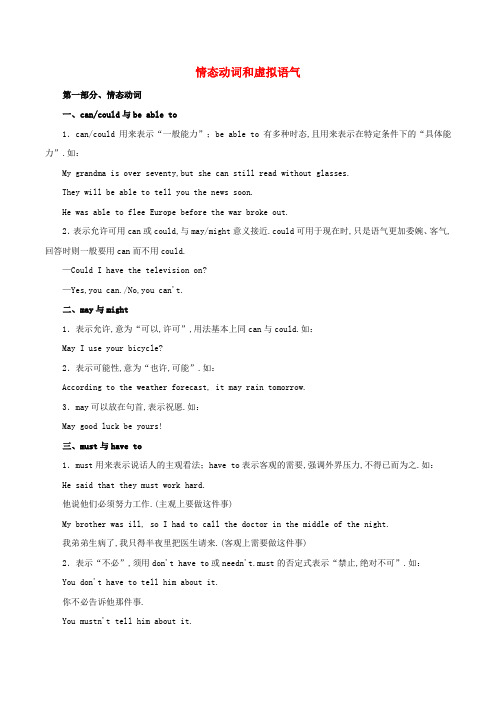
情态动词和虚拟语气第一部分、情态动词一、can/could与be able to1.can/could用来表示“一般能力”;be able to有多种时态,且用来表示在特定条件下的“具体能力”.如:My grandma is over seventy,but she can still read without glasses.They will be able to tell you the news soon.He was able to flee Europe before the war broke out.2.表示允许可用can或could,与may/might意义接近.could可用于现在时,只是语气更加委婉、客气,回答时则一般要用can而不用could.—Could I have the television on?—Yes,you can./No,you can't.二、may与might1.表示允许,意为“可以,许可”,用法基本上同can与could.如:May I use your bicycle?2.表示可能性,意为“也许,可能”.如:According to the weather forecast, it may rain tomorrow.3.may可以放在句首,表示祝愿.如:May good luck be yours!三、must与have to1.must用来表示说话人的主观看法;have to表示客观的需要,强调外界压力,不得已而为之.如:He said that they must work hard.他说他们必须努力工作.(主观上要做这件事)My brother was ill, so I had to call the doctor in the middle of the night.我弟弟生病了,我只得半夜里把医生请来.(客观上需要做这件事)2.表示“不必”,须用don't have to或needn't.must的否定式表示“禁止,绝对不可”.如:You don't have to tell him about it.你不必告诉他那件事.You mustn't tell him about it.你绝不能告诉他那件事.—Must we do it now?我们必须现在做吗?—No, you needn't.不,你们不必.四、shall1.用于第一、第三人称的疑问句中,用来征求对方的意见或请求指示.如:What shall he do next?他下一步干什么呢?2.用于第二、第三人称的陈述句中,表示说话人的意愿,有“命令、警告、允诺、威胁、强制”等意思.如:He shall stay in bed.他必须躺在床上.You shall have it back next week.下周一定还你.He says he won't go, but I say he shall.他说他不去,但我说他必须去.五、will与would1.will用于各种人称,表示“意志、意愿”或“决心”等.如:If you will keep your watch half an hour slow, it is hardly surprising that you are late for your appointments.如果你想要让你的表慢半个小时,你约会时迟到就不足为怪了.2.will表示习惯性的动作,有“总是,惯于”的含义.如:An Englishman will usually show you the way in the street.英国人通常是会在街上给你指路的.3.would可表示过去反复发生的动作.如:On Sundays he would get up early and go fishing.星期天他总是早起去钓鱼.六、should与ought to1.should表示“建议”或“劝告”,有“应该”之意.如:You should learn from each other.2.ought to表示根据某种义务或必要“应当”做某事.如:Everyone ought to obey the traffic regulations.3.should和ought to也可用来表示推测,意为“想必会……”.如:—When can I come for the photos? I need them tomorrow afternoon.—They should be ready by 1200.七、情态动词表示推测1.can用于肯定句中表示客观的可能性,意为“有时会”;用于疑问句中可以表示推测,意为“可能”,有时表示一种惊讶的语气;用于否定句中也可以表示推测,can't意为“不可能”,语气很强烈.It is usually warm in my hometown in March, but it can be rather cold sometimes.我的家乡在三月份通常很暖和,但有时候也会相当冷.Mr. Bush is on time for everything. How can it be that he was late for the meeting?布什先生做什么事情都很准时,他怎么可能开会迟到呢?—Let's visit Tom together, Stephen.—There's no need to do so. He can't be at home, because I saw him board the flight to Beijing this morning.——Stephen,咱们一起拜访汤姆吧.——没必要这样做.他一定不在家,因为今天早晨我看见他登上了飞往北京的航班.2.may/might用于肯定句中可以用来表示不十分肯定的推测,意为“有可能”;用于否定句中也可以表示推测,may not意为“可能不”,表示一种不太确定的语气.The traffic is heavy these days. I might arrive a bit late, so could you save me a place?这些天交通很繁忙,我可能会来晚一点,请你帮我保留个位置好吗?3.must表示推测时只能用于肯定句中,意为“一定,必定”,表示十分肯定的语气(在疑问句中或否定句中要用can/could).—It's the office! So you must know eating is not allowed here.—Oh, sorry.——这是办公室!所以你一定知道这里不许吃东西.——噢,对不起.4.should用来表示推测时意为“应该”,即含有“按道理来说应当如此”的意思.There shouldn't be any difficulty about passing the road test since you have practiced a lotin the driving school.因为你在驾校训练了这么多,通过路考应该没什么困难.八、“情态动词+have done”结构1.should/ought to+have done,表示“过去本应该做而(实际)没有做的事情”,含有责备或遗憾的语气,意为“本应该……”.其否定形式为“should not/ought not to have+done”,表示某种行为本不该发生但实际上发生了.I shouldn't have watched that movie—it'll give me horrible dreams.我本不应该看那部电影——它会令我做噩梦.You ought to have come to the party yesterday, but why didn't you come?昨天你本来应该参加聚会的,可是你为什么不来?2.must+have done,用于肯定句,表示“过去一定做过某事”,表示一种很有把握的推测.注意,对过去发生的情况的否定推测常用“can't/couldn't+have done”表示.—Ye Shiwen won two gold medals in London Olympic Games.—She must have gone through tough training.——叶诗文在伦敦奥运会获得了两枚金牌.——她肯定受到严格的训练.—Do you know where David is? I couldn't find him anywhere.—Well. He can't have gone far—his coat's still here.——你知道大卫在哪里吗?我到处找不到他.——大卫的上衣还在这里,因此他肯定没走远.3.needn't+have done,表示“过去没有必要做某事,但实际上做了某事”.Mark needn't have hurried. After driving at top speed, he arrived half an hour early.马克本没必要那么匆忙.他以最快速度开车,结果早到了半个小时.4.may/might+have done,表示对过去情况的一种不太有把握的可能性的推测,表示“可能已做了某事……”,否定句表示“可能还没有……”.Sorry, I'm late. I might have turned off the alarm clock and gone back to sleep again.对不起,我迟到了.我可能把闹钟关掉后又睡着了.5.could+have done表示“过去本来可以做某事,但实际上没有做”;can/could+have done表示“过去可能做了某件事”.I could have saved the poor rabbit, but I didn't have the right drugs with me at that moment.我本来可以拯救那只可怜的兔子的,可是我当时没有合适的药品.第二部分、虚拟语气一、虚拟语气在虚拟条件句中的用法1.在具体运用中,条件从句中有时可省略if而采用倒装结构.如:Had it not been for your help, we wouldn't have achieved so much.2.介词without/but for、连词but、副词otherwise常用来表示某种假设条件.如:I wouldn't have made such rapid progress without your help.3.有时候从句动作和主句动作发生的时间不一致,这时谓语动词的形式要根据各自的时间来调整.如:If the weather had been more favourable, the crops would be growing still better.二、“should+动词原形”表示的虚拟语气这一类型常见词有“一坚持(insist)、二命令(order, command)、三建议(advise, suggest, propose)、四要求(request, require, demand, desire)”.以上词及其派生名词所接的名词性从句都使用“(should +)动词原形”的虚拟语气.①Jane's pale face suggested that she was ill, and her mother suggested that she(should) havea medical examination.简苍白的脸色表明她病了,她母亲建议她去检查身体.②She insisted that the man had stolen her car and that he(should) be sent to prison.她坚持说那个男人偷了她的车,并坚决要求他坐牢.三、特殊句式中的虚拟语气If only/It's (high) time (that)...wish/would rather/as if等固定句式要求用相应的虚拟语气表达形式.①I wish I could fly.真希望我能飞.②I would rather you came tomorrow.我宁愿你明天来.③If only I had taken your advice!要是听从了你的建议该多好啊!高频考点一、考查情态动词例1.(2018·北京卷)In today’s information age, the loss of data _________ cause serious problems for a company.A. needB. shouldC. canD. must【答案】C【解析】考查情态动词.句意:在今天的信息时代,数据的丢失有时会对一个公司造成严重的问题.数据丢失造成严重问题是客观上会发生的情况,即“客观可能性”,故该空应用情态动词can.C选项正确.其余情态动词均没有该用法.need需要;should应该,竟然;must必须,肯定.【变式探究】—Can’t you stay a little longer?—It’s getting late. I reall y _____go now, My daughter is home alone.A .mayB .canC . mustD .dare【答案】C【解析】句意:——你不能再多待会儿吗?——很晚了,我必须得走了.我女儿一个人在家.A. may可能,可以,也许;B. can能,会;C. must必须,必然要,必定会;D. dare敢,胆敢.结合句意,故选C.【变式探究】________ I have a word with you? It won’t take long.A. CanB. MustC. ShallD. Should【答案】A【解析】本题考察的是情态动词基本意义辨析.Can能够,可能;must必须,一定;非得;shall将要;should应该;句意:我可以和你谈谈吗?不会花很多时间的.根据句意可知本题使用can I…?表示询问对方是否允许.如:Can I use your dictionary?我可以使用你的字典吗?故A正确.高频考点二、考查情态动词的用法例2. (2018·天津卷) I can't find my purse. I___________ it in the supermarket yesterday, but I'm not sure.A. should leaveB. must have leftC. might leaveD. could have left【答案】D【解析】考查情态动词表推测.句意:我不能找到我的钱包了,昨天我有可能把它落到超市了,但我不确定.根据句中时间状语yesterday可知,是对过去事情的推测,故用情态动词+ have done,再根据后句but I’m not sure.可知,此推测为不能肯定的推测,故用情态动词could,表示“可能”.故选D.【变式探究】(2017•天津)My room is a mess, but I __________clean it before I go out tonight.I can do it in the morning.A. daren’tB. shouldn’tC. needn’tD. mustn’t【答案】C【解析】句意:我的房间很乱,但是在今晚我出去之前不需要打扫,我可以明天早晨再打扫.A.不敢;B.不应该;C不需要;D.不许.根据句意,故选C.【变式探究】Why didn't you tell me about your trouble last week?If you ________(tell)me,I could have helped.【答案】had told【解析】句意:上个星期你为什么不告诉我你的麻烦事?如果你告诉我了,我就能帮你.根据句意和相关信息判断,条件句表示与过去事实相反的假设,此时从句用过去完成时,主句谓语用“情态动词+have done”形式.【变式探究】I ______ have worried before I came to the new school, for my classmates here are very friendly to me.A. mightn’tB. mustn’tC. needn’tD. couldn’t【答案】C【解析】句意:我来新学校之前本没有必要担心,因为在这里我的同学对我非常友好.needn’t have done本没有必要做某事,表示实际上已经做了某事.根据句意可知选C.高频考点三、考查虚拟语气例3.(2019·天津卷)The workers were not better organized, otherwise they ________ the task in half the time.A.accomplished B.had accomplishedC.would accomplish D.would have accomplished【答案】D【解析】考查虚拟语气.句意:工人们没有被组织好,否则的话他们会用那一半的时间完成任务的.此处otherwise表达了一种含蓄虚拟;otherwise前的内容所述的是过去的事实,相当于if引导的条件状语从句“If the workers had been better organized”,因此后半部分应用“主语+would have done sth.”的结构.故选D.【举一反三】【2018·江苏】It’s strange that he _______have taken the books without the owner’s permission.A. wouldB. shouldC. couldD. might【答案】B【解析】考查虚拟语气.句意:真奇怪,他竟然没有主人的允许就拿走了这些书.在句型”It is important/necessary/strange/impossible/natural that...”中,其中由that引导的主语从句通常用“should+动词原形”这样的虚拟语气,其中的should可以省略.故选B.【变式探究】(2017·北京)If the new safety system _______ to use, the accident would never have happened.A. had been putB. were putC. should be putD. would be put【答案】A【解析】句意:如果这个新的安全系统被投入使用过的话,这个事故就不会发生了.根据主句确定是对过去情况的虚拟,所以从句谓语用had done形式,此外根据句意可知是被动,用被动语态,故A项是正确的.【变式探究】________(have)the governments and scientists not worked together,AIDSrelated deaths would not have fallen since their highest in 2005.【答案】Had【解析】句意:如果政府和科学家不共同努力,与艾滋病相关的死亡就不会从2005年的最高点下降.这是一个省略了从属连词if的虚拟语气句,使用了倒装句式.根据主句的would not have fallen可知,这里是表示过去的虚拟语气,所以用had.【变式探究】Without his wartime experiences, Hemingway____ his famous novel A Farewell to Arms.A.didn’t writeB. hadn’t writtenC. wouldn’t w riteD. wouldn’t have written【答案】D【解析】句意:没有他战时的经验,海明威就不可能写出著名的小说永别了武器.根据without his wartime experience没有战时的经历,可知表示对于过去的否定猜测,故主句用would have done,因此选D 项.1.(2019·天津卷)The workers were not better organized, otherwise they ________ the task in half the time.A.accomplished B.had accomplishedC.would accomplish D.would have accomplished【答案】D【解析】考查虚拟语气.句意:工人们没有被组织好,否则的话他们会用那一半的时间完成任务的.此处otherwise表达了一种含蓄虚拟;otherwise前的内容所述的是过去的事实,相当于if引导的条件状语从句“If the workers had been better organized”,因此后半部分应用“主语+would have done sth.”的结构.故选D.2.(2019·江苏卷)What a pity! You missed the sightseeing, or we ________ a good time together.A.had B.will haveC.would have had D.had had【答案】C【解析】考查虚拟语气.句意:多么遗憾!你错过了这次游览.否则,我们就可以一起度过一段愉快的时光.根据关键词or可知,这里表示与过去的事实相反,谓语动词应用would/could/should/might+have done.1.【2018·江苏】 There is a good social life in the village, and I wish I _______ a second chance to become more involved.A. hadB. will haveC. would have hadD. have had【答案】A【解析】考查虚拟语气.句意:在这个村里有很好的社交生活,并且我希望我再有机会去更多的参与.本题考查wish引导的宾语从句,表示与现在事实相反的愿望,所以从句用一般过去时.故选A.2.【2018·江苏】It’s strange that he _______have taken the books without the owner’s permission.A. wouldB. shouldC. couldD. might【答案】B【解析】考查虚拟语气.句意:真奇怪,他竟然没有主人的允许就拿走了这些书.在句型”It isimport ant/necessary/strange/impossible/natural that...”中,其中由that引导的主语从句通常用“should+动词原形”这样的虚拟语气,其中的should可以省略.故选B.3.(2018·天津卷) I can't find my purse. I___________ it in the supermarket yesterday, but I'm not sure.A. should leaveB. must have leftC. might leaveD. could have left【答案】D【解析】考查情态动词表推测.句意:我不能找到我的钱包了,昨天我有可能把它落到超市了,但我不确定.根据句中时间状语yesterday可知,是对过去事情的推测,故用情态动词+ have done,再根据后句but I’m not sure.可知,此推测为不能肯定的推测,故用情态动词could,表示“可能”.故选D.4.(2018·北京卷)In today’s information age, the loss of data _________ cause serious problems for a company.A. needB. shouldC. canD. must【答案】C【解析】考查情态动词.句意:在今天的信息时代,数据的丢失有时会对一个公司造成严重的问题.数据丢失造成严重问题是客观上会发生的情况,即“客观可能性”,故该空应用情态动词can.C选项正确.其余情态动词均没有该用法.need需要;should应该,竟然;must必须,肯定.5.(2018·北京卷)They might have found a better hotel if they _________ a few more kilometers.A. droveB. would driveC. were to driveD. had driven【答案】D【解析】考查虚拟语气.句意:如果他们多开几公里的话,他们也许会找到一个更好的旅馆.由“they might have found a better hotel”可知,该句是表示对过去的虚拟.if ____ a few more kilometers是条件句部分,表示对过去的虚拟,条件句部分要用过去完成时态,故D选项正确.1.(2017·北京)Samuel, the tallest boy in our class, ______ easily reach the books on the top shelf.A. mustB. shouldC. canD. need【答案】C【解析】A. must 必须 B. should 应该 C. can 能 D. need 需要.句意:Samuel,我班最高的男生,能很轻松地够着书架顶上的书,此处需要一个表示能力的词,故用can,答案为C.2.(2017•天津)My room is a mess, but I __________clean it before I go out tonight. I can do it in the morning.A. daren’tB. shouldn’tC. needn’tD. mustn’t【答案】C【解析】句意:我的房间很乱,但是在今晚我出去之前不需要打扫,我可以明天早晨再打扫.A.不敢;B.不应该;C不需要;D.不许.根据句意,故选C.3.(2017•江苏) _______ not for the support of the teachers, the student could not overcome her difficulty.A. It wereB. Were itC. It wasD. Was it【答案】B【解析】考查虚拟语气和倒装.虚拟语气中,be动词统一用were;虚拟语气的省略形式主要是把if省略,同时把were/should/had提前,即Were /Should/ Had I...,故选B.句意:要不是老师们的支持,该生是无法克服她自己的困难的.4.(2017·江苏卷) ____________ not for the support of the teachers, the student could not overcome her difficulty.A. It wereB. Were itC. It wasD. Was it【答案】B【解析】考查虚拟语气的省略.虚拟语气中,be动词统一用were;虚拟语气的省略形式主要是把if省略,同时把were/should/had提前,即Were /Should/ Had I...,故选B.5.(2017•江苏) _______ not for the support of the teachers, the student could not overcomeher difficulty.A. It wereB. Were itC. It wasD. Was it【答案】B【解析】考查虚拟语气和倒装.虚拟语气中,be动词统一用were;虚拟语气的省略形式主要是把if省略,同时把were/should/had提前,即Were /Should/ Had I...,故选B.句意:要不是老师们的支持,该生是无法克服她自己的困难的.6.(2017·北京)If the new safety system _______ to use, the accident would never have happened.A. had been putB. were putC. should be putD. would be put【答案】A【解析】句意:如果这个新的安全系统被投入使用过的话,这个事故就不会发生了.根据主句确定是对过去情况的虚拟,所以从句谓语用had done形式,此外根据句意可知是被动,用被动语态,故A项是正确的.1.(2016·浙江,15)________(have)the governments and scientists not worked together,AIDSrelated deaths would not have fallen since their highest in 2005.【答案】Had【解析】句意:如果政府和科学家不共同努力,与艾滋病相关的死亡就不会从2005年的最高点下降.这是一个省略了从属连词if的虚拟语气句,使用了倒装句式.根据主句的would not have fallen可知,这里是表示过去的虚拟语气,所以用had.2.(2016·浙江,17)George can't ________(go)too far.His coffee is still warm.【答案】have gone【解析】句意:乔治不可能走得太远了.他的咖啡仍然是温的.can't have done是对过去的否定推测.3.(2016·北京,34)Why didn't you tell me about your trouble last week?If you ________(tell)me,I could have helped.【答案】had told【解析】句意:上个星期你为什么不告诉我你的麻烦事?如果你告诉我了,我就能帮你.根据句意和相关信息判断,条件句表示与过去事实相反的假设,此时从句用过去完成时,主句谓语用“情态动词+have done”形式.。
情态动词详解+例句

—His cell phone is here, so he ________ have gone too far.
A.mustn’tB.needn’t
C.wouldn’tD.can’t
5.“should / ought to + have +过去分词”表示过去本该做某事但没做,其否定式表示过去不该做某事但做了,这种句式含有不满或责备之意,ought to的语气比should强一些。如:
You ought to / should have studied harder.你本应该更努力学习的.(但没有)
A.should have avoidedB.should be avoided
C.could have avoidedD.could have been avoided
【答案】D
【解析】
【详解】
考查“情态动词+完成式”。句意:如果愤怒的女乘客和巴士司机保持冷静,这起导致15人死亡的事故本来是可以避免的。could have done“本来能做而没有做”,且句子主语The accident和谓语动词avoid之间是被动关系,结合句意可知答案为D。
1. Shall用于第一人称,表示征求对方的意愿。如:What shall we do this evening?
2. Shall用于第一、第三人称疑问句中,表示说话人征求对方的意见或向对方请示。如:Shall we begin our lesson?When shall he be able to leave the hospital?
【点睛】
高考英语语法考点解读:情态动词和虚拟语气

情态动词主要用来表示说话人的情感、态等,是中英语语法的重点,也是高考的热点,是单项填空必考的一个知识点。
情态动词在近五高考中主要考查四点:情态动词表示推测和可能性的用法;情态动词与虚拟语气;情态动词表达“情感、态、语气等”;情态动词表示“必要性”等方面的用法。
虚拟语气的考点主要集中在名词性从句、条件句中的用法,以及错综条件句中虚拟语气的应用。
一、情态动词表推测的用法headmaster.①That maynot be true.①He couldn'thavediscovered thetruth.注意:should (ought to)表示推测是高考考查的重点和难点。
如:—When can I come for the photos?I need them tomorrow afternoon.—They ________ be ready by 12:00.A.can B.should C.might D.need【解析】B A项表示推测时常用于否定句和疑问句中。
C项表示推测语气不太肯定。
should意为“按理说,理应”,既回答了顾客的询问,不失礼貌,又为照片有可能尚未洗好,顾客到时取不到留下了回旋的余地,体现了店主的精明与用词经过仔细推敲。
二、情态动词的其他用法1.can, could, may, might2.must, should3. need, dare4.shall/will/would4.shall/will/would4.shall/will/would二、情态动词+have done四、虚拟语气虚拟语气表示说话人所说的话不是事实,而是一种假设、愿望、怀疑或推测。
1.虚拟语气在条件句中的用法If it were to rain tomorrow, I should not drive my car. 如果明天下雨的话,我就不开车了。
(明天的情况还不知道)If I had done it in time, I should have had a good time. 如果我及时做的话,日子就好过多了。
高考英语情态动词讲解

高考英语情态动词讲解公司内部编号:(GOOD-TMMT-MMUT-UUPTY-UUYY-DTTI-(一)情态动词常考点(一)表能力如:I am starving to death。
I can eat two bowls of rice now。
(现在的能力)我快饿死了,现在我能吃两碗米饭。
If you have a good sleep,you will be able to work out this problem。
(将来的能力)如果你好好睡一觉,你将能够解出这道题。
The fire spread through the hotel very quickly but everyone was able to get out。
(过去有能力做并且成功的做了某事)尽管这场大火迅速蔓延到了整个宾馆,但是每个人都能够逃出去。
I could have worked out the problem,but I didn’t。
(过去有能力做但未做)我本来可以解决这个问题,但没有解决。
(二)表推测(可能性)1.可能性可分为客观的可能性和具体事情实际发生的可能性两种。
所谓客观的(理论的)可能性即并不涉及具体某事是否会发生,此种用法常常可以说明人或事物的特征。
情态动词can可用于肯定句中表示客观的(理论的)可能性,而表示具体事情实际发生的可能性时,can一般不用于肯定句。
如:Accident can happen on such rainy days。
这样的多雨天气有可能会发生事故。
(客观的可能性)Peter may come with us tonight,but he isn’t sure yet。
彼得今晚可能和我们来,但他还没确定。
(实际可能性,不用can)2.表示具体事情实际发生的可能性:这可能是他做的吗?Mr. Bush is on time for everything。
How can it be that he was late for the opening ceremony?(表示疑惑、惊讶)布什先生做每件事都很按时。
情态动词考点解析(Word版附答案)

情态动词考点解析(Word版附答案)一、初中英语情态动词1.—Must I clean the classroom now? —No, you_______.A. mustn'tB. can'tC. needn't【答案】 C【解析】【分析】句意:--我必须现在把教室打扫干净吗?--不,你不必。
must I do …?的否定回答是No, you needn't 或者 No , you don't have to 。
根据是否定回答,故选C。
2.—Where is George?—He _______ be here just now. His coffee is still warm.A. needB. can'tC. mustD. shouldn't【答案】 C【解析】【分析】句意:——乔治在哪里?——他刚才一定在这里,他的咖啡还是热的。
A. need需要; B. can't 不能,不可能(表示推测); C. must 必须,一定(表示推测); D. shouldn't不应该;根据His coffee is still warm.可知表示肯定推测一定在这儿;故答案为C。
【点评】考查情态动词。
掌握情态动词表推测时的意义和用法。
3.According to the law, traffic keep to the left in England.A. mayB. mustC. needD. can【答案】 B【解析】【分析】句意:根据法律规定,在英国车辆必须靠左形式。
A.may可以,表示允许;B.must必须,表示要求;C.need需要,表示必要性;D.can能,表示能力。
根据According to the law,可知法律的要求,应是必须的,应用must,故答案为B。
【点评】考查情态动词。
掌握情态动词的常用法。
4.— __________I wear a tie to Janet's birthday party?— No,you needn't. But do remember to bring her a present.A. MustB. ShouldC. NeedD. Can【答案】 A【解析】【分析】句意:——我必须戴领带去参加Jane的生日聚会吗?——不,你不必,但是记住给她带个礼物。
语法-情态动词(学生版)
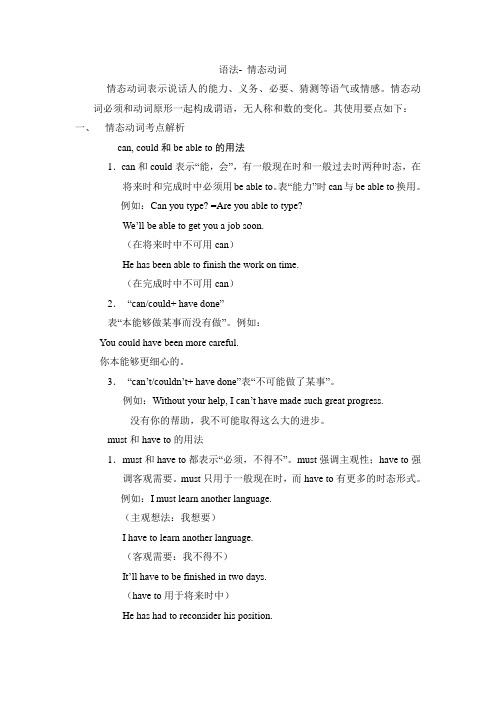
语法- 情态动词情态动词表示说话人的能力、义务、必要、猜测等语气或情感。
情态动词必须和动词原形一起构成谓语,无人称和数的变化。
其使用要点如下:一、情态动词考点解析can, could和be able to的用法1.can和could表示“能,会”,有一般现在时和一般过去时两种时态,在将来时和完成时中必须用be able to。
表“能力”时can与be able to换用。
例如:Can you type? =Are you able to type?We’ll be able to get you a job soon.(在将来时中不可用can)He has been able to finish the work on time.(在完成时中不可用can)2.“can/could+ have done”表“本能够做某事而没有做”。
例如:You could have been more careful.你本能够更细心的。
3.“can’t/couldn’t+ have done”表“不可能做了某事”。
例如:Without your help, I can’t have mad e such great progress.没有你的帮助,我不可能取得这么大的进步。
must和have to的用法1.must和have to都表示“必须,不得不”。
must强调主观性;have to强调客观需要。
must只用于一般现在时,而have to有更多的时态形式。
例如:I must learn another language.(主观想法:我想要)I have to learn another language.(客观需要:我不得不)It’ll have to be finishe d in two days.(have to用于将来时中)He has had to reconsider his position.(have to用于现在完成时)2.两者的否定意义不同:mustn’t表示“禁止;不可以”,而don’t have to 表示“不必”,意思相当needn’t。
英语情态动词考点例析及展望

AS c h o o l G a r d e n O f E n g l 英语情态动词考点例析及展望贵州何居华考查情态动词的用法几乎是每年高考单项选择题的必考要点。
随着高考的深入和变化,出题的角度和思路都在更新,但不管怎样变化,还是脱离不了考查情态动词的基本含义、词与词在使用上的细微差别和它们的常用搭配等方面。
一、考查情态动词的基本含义和用法1.(NM ET 2004,Ⅰ)—Isn .t that Ann .s husband over there ?—No ,it be him.I .m sure he do esn .t w ear g lasses.A.can .tB.must notC.wo n .tD.may no t 简析:答案为A 。
从“他”不戴眼镜的情况可以作出判断,他“不会”是安的丈夫。
must 表示非常“有把握,错不了”,will 表示“心愿”,may 在表示“猜测”意义时,指可能性较大。
B 、C 、D 三项均不符合题意,只有can .t 含“不会”之意。
2.(NM ET 2003,Ⅰ)A left-lugg age office is a place w here bags be left for a short time ,especially at a railway station.A.should B.can C.must D.w ill 简析:答案为B 。
should 是“应该”的意思,must 语气较强,表示“必须、必定、应当”的意思,will 则表示按照事情发展将会怎样,三者都没有“能够”的意思,故均属错误选项。
此题的意思是“行李寄存处是指特别是火车站等处能够暂时存放行李的地方”。
只有can 符合此意。
3(NM T ,Ⅰ)—I y ?6i s h.E 2002s John coming b train中学英语园地—He should ,but he not.He likes driving his car.A.mustB.canC.needD.may简析:答案为D 。
高中英语真题-第九讲 情态动词和虚拟语气

高中英语真题:第九讲情态动词和虚拟语气一、情态动词考点透析1.can (could),be able to。
can只有现在式can和过去式could两种形式, be able to可用于现在式、过去式、将来时、完成时。
要表示“能够做某事”,可用can或be able to,但若要说过去的确运用了某种能力做成了某件事情,就只能用was/were able to,表将来具备的能力只能用will/shall be able to。
(1)If you study hard,you will be able to express freely in English in three months. (2)The fire spread through the hotel very quickly but everyone was able to get out.2.could是can的过去式,但是在很多情况下,特别是在口语中,它表示语气的委婉。
因此,用could提问时,不能用could 回答,而要用can或may。
would,might用于疑问句时也表委婉语气,回答时应该用will,may。
(1)-Could I borrow your dictionary?-Yes,of course you can.(2)-Could I call you by the first name?-Yes,you may.(3)-Would you be so kind as to explain the word?-Yes,I will.What is it?3.may/might,can/could都可表示可能,但may/might 不能用于问句,can/could用于否定句、疑问句、感叹句,表示惊异、怀疑,一般不用于肯定句。
如果用于肯定句,则表示偶尔发生某事的可能,或某人某物一时的特点。
(1)-Are you coming to Jeff's party?-I'm not sure.I might go to the concert instead.(2)-Where can Mr.Li be?-Sorry,I don't know.You can go to ask Mr.Zhang.He may help you.(3)Mr.Bush is on time for everything.How can it be that he was l ate for the opening ceremony?(4)We enjoy good weather in January,but sometimes it can be terribly cold.4.must表推测用于肯定句,其否定式要用can't。
情态动词-高考-常考点讲解与分析-附答案

第十一讲:情态动词一、常见考点:1. can, must, may, should, might表示推测时的区别2. can’t,must n’t,may not, needn’t等否定形式的用法3. should和ought to表示“义务”和“推断”的用法4. shall和will 作为情态动词用时的用法特点5。
need 和dare 作为情态动词和实义动词用时的用法特点6. had better,used to 和would rather的各类用法特点。
二、情态动词的基本用法:1.can(could)(1)能.。
.、会。
..。
(表示能力)He can speak English better than you注意:①be able to 强调经过努力、克服困难等完成某事;则was/were able to表示过去经过努力等成功的做成了某事;②could 表示原来具备某种能力,现在没有这种能力了(2)能够。
..、可以。
.(表示可能、许可)“May I use your telephone?”“Yes, you can.” / You can't park your car in this street.注意:此时,can可以表示表示理论上的或逻辑上的,或偶尔发生的事情,或一时的事情或特有的事情.如:It can be windy on the top of the mountain./ she can be forgettable sometimes。
/ Tigers can be dangerous。
/Jogging can be harmful for the health。
The temperature can fall to -60℃。
(气温可降至零下60℃)(3)请做。
、得。
.(表示温和的命令)I will do the cooking,and you can do the washing. 我来做饭,请你去洗衣服(4)能不能。
情态动词考点解析(Word版附答案)经典
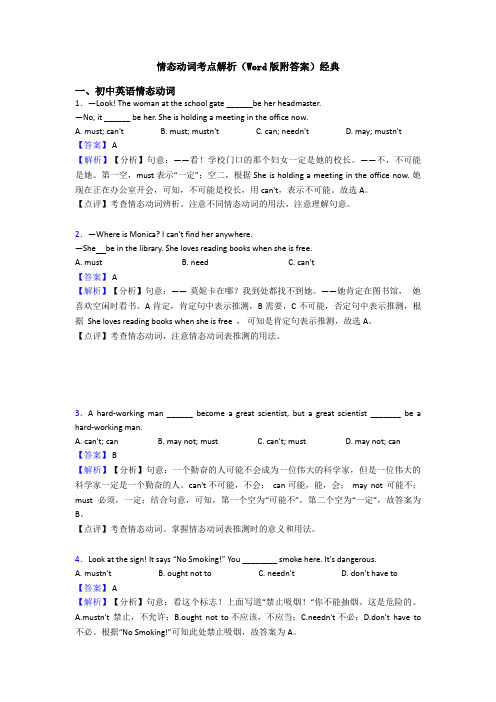
情态动词考点解析(Word版附答案)经典一、初中英语情态动词1.—Look! The woman at the school gate ______be her headmaster.—No, it ______ be her. She is holding a meeting in the office now.A. must; can'tB. must; mustn'tC. can; needn'tD. may; mustn't【答案】 A【解析】【分析】句意:——看!学校门口的那个妇女一定是她的校长。
——不,不可能是她。
第一空,must表示“一定”;空二,根据She is holding a meeting in the office now. 她现在正在办公室开会,可知,不可能是校长,用can't,表示不可能。
故选A。
【点评】考查情态动词辨析。
注意不同情态动词的用法,注意理解句意。
2.—Where is Monica? I can't find her anywhere.—She be in the library. She loves reading books when she is free.A. mustB. needC. can't【答案】 A【解析】【分析】句意:——莫妮卡在哪?我到处都找不到她。
——她肯定在图书馆,她喜欢空闲时看书。
A肯定,肯定句中表示推测,B需要,C不可能,否定句中表示推测,根据 She loves reading books when she is free ,可知是肯定句表示推测,故选A。
【点评】考查情态动词,注意情态动词表推测的用法。
3.A hard-working man ______ become a great scientist, but a great scientist _______ be a hard-working man.A. can't; canB. may not; mustC. can't; mustD. may not; can【答案】 B【解析】【分析】句意:一个勤奋的人可能不会成为一位伟大的科学家,但是一位伟大的科学家一定是一个勤奋的人。
- 1、下载文档前请自行甄别文档内容的完整性,平台不提供额外的编辑、内容补充、找答案等附加服务。
- 2、"仅部分预览"的文档,不可在线预览部分如存在完整性等问题,可反馈申请退款(可完整预览的文档不适用该条件!)。
- 3、如文档侵犯您的权益,请联系客服反馈,我们会尽快为您处理(人工客服工作时间:9:00-18:30)。
情态动词考点例析情态动词是体现特定情感态度的助动词,后接动词原形,是动词“大家族”中的重要成员。
让我们一起走进情态动词“园地”吧!★情态动词一表通注意:(1) “May I…?”的否定回答多用mustn‟t。
例如:—May I go?—No, you mustn‟t.(2) 回答must引出的问句时,肯定回答用must,否定回答用needn‟t或don‟t have to。
例如:—Must I leave right now?—No, you needn‟t.(3) need也可作行为动词,有人称、数和时态的变化。
例如:He needs to make a plan.★情态动词考点秀一、考查情态动词表示推测的用法表示推测的情态动词通常有must, can, may, could, might。
must表示说话人对事物把握性较大的推测,意为“一定;准是”,只能用于肯定句;can多用于否定句,表示有把握的否定推测,用于疑问句中可表示询问性的推测;may, could, might表示可能性较小的推测,意为“或许;有可能”,用于陈述句和疑问句中皆可。
may not, could not, might not表示不太有把握的否定推测,意为“可能不会”。
【典型考题】1. It‟s nearly seven o‟clock. Jack ______ be back home at this moment.A. mustB. needC. couldD. can【简析】本题考查情态动词表推测,由前句“将近7点了”推测“杰克一定回家了”,故选A项。
2.—Listen! Is Tom singing in the classroom?—No, it _____ be Tom. He has gone to Paris.A. may notB. needn‟tC. can‟tD. mustn‟t【简析】本题考查情态动词表否定推测的用法,由答句中“他去了巴黎”可知要用can‟t 表示“一定不是”,故选C项。
3.—Are you going to Beijing by plane?—It‟s fast, but e xpensive. So I am not sure. I _____ take a train.A. shouldB. mayC. mustD. will【简析】由“我不确定”判定后面应该是“可能……”,所以选B项。
二、考查情态动词表示必要性的用法表示必要性的情态动词主要有must, need, have to。
must表示“必须;应该”,强调责任、义务,回答时用needn‟t表示“不必”,而mustn‟t表示“禁止”;need表示“必要;需要”,否定式为n eedn‟t;have to强调主观上不愿意但是客观上不得不做某事,否定式为“助动词+not have to”,它有人称、数和时态的变化。
【典型考题】1.—May I swim in the lake, Dad?—No, you ______. Look! Here is a notice “No Swimming!”A. may notB. mightn‟tC. mustn‟tD. needn‟t【简析】由下句“这儿有个告示…不准游泳!‟”,可知应为mustn‟t表示“禁止”,故选C 项。
2.—Mike, I can‟t stop playing computer games.—For your eyes, my dear friend, I‟m afraid you _____.A. have toB. mayC. mustD. can【简析】根据句意可知这是客观上的“必须”,故选A项。
3.—Must I stay at home and take care of her?—No, you ______.A. mustn‟tB. won‟tC. can‟tD. needn‟t【简析】以must引导的疑问句进行否定回答时要用needn‟t,故选D项。
三、考查情态动词表示许可的用法may, can, could都可以用于一般疑问句,用来征求对方意见,请求对方允许,意为“可以”。
肯定回答时用can,否定回答时用can‟t。
此外can表示能力的基本用法,也是中考常考点。
【典型考题】1.—Could I go to the movie this weekend, Dad?—Yes, you ______. But you have to come back before nine.A. shallB. mustC. needD. can【简析】情态动词could表示“可以,能”,相当于can,语气较委婉。
根据句意应选D项。
2.—______ you come to my birthday party tomorrow, Robert?—I‟m afraid not. I have to study for my ex am.A. MustB. ShouldC. CanD. Need【简析】根据句意应该用can,意为“罗伯特,明天你能来参加我的生日聚会吗?”故选C项。
3.—_____ you play golf?—No. But I can play table tennis.A. CanB. MayC. MustD. Should【简析】由答句可知问句应为“你会打高尔夫球吗?”故用情态动词can。
情态动词训练营一、用适当的情态动词填空。
1.—_____ we play football now?—Good idea!2._____ you mind my smoking?情态动词考点例析3.We _____ (not)walk on the grass.4.—That sweater _____ be mine.—No,it _____ be yours.5.Jim left his book at home. He _____ borrow one from his classmate.6.Hi!_____ I speak to Mary,please?7.—_____ you lend me your bike?—Yes,of course.Here you are.8.—_____ I do it now?—No,you _____. You may do it next week.9.There are some papers you can use. You _____ buy any.10.—Could I borrow your pen?—Yes, you _____.11._____ I have your name, please?12.They‟ll go hiking tomorrow, so _____ we.13.The book _____ be returned before Sunday.14.Mother is ill. She _____ stay at home and look after her.15.Now David _____ speak a littleChinese, but he _____ speak Japanese.二、选择填空。
1. —May I go to the cinema, Mum?—Certainly. But you _____ be back by 11 o‟clock.A. canB. mayC. mustD. need2. Even the top students in our clas s can‟t work out this problem. So it_____ be very difficult.A. mayB. mustC. canD. need3. You‟d better go and ask Mr Yang. He _____ know how to surf the Internet.A. wouldB. can‟tC. mayD. couldn‟t4. —_____ you try out all the ideas?—No,I_____.A. Must; mustn‟tB. Need; needC. Must; don‟t have toD. Must; don‟t5. —Could I look at your pictures?—Yes, of course you _____.A. couldB. mustC. canD. will6. —It‟s nearly 6:00pm. Will you have supper here?—Sorry, I _____. I have many things to do.A. mustn‟tB. can‟tC. needn‟tD. don‟t7. You ______ go and ask Meimei. She ______ know the answer.A. must; canB. must; mayC. need; canD. can; may8. There is an old saying, “The cleverest housewife _____ cook a meal without rice”.A. may notB. mustn‟tC. needn‟tD. can‟t9. —Must I finish the work before five o‟clock?—No, you ______.A. needn‟tB. mustn‟tC. have toD. may not10. —Who is making noises?—It ______ be Tom. He is sleeping now.A. can‟tB. may notC. mustn‟tD. might notKey:一、1.Shall2.Would 3.mustn‟t4.must,can‟t 5.had to6.May/ Can/ Could7.Could/ Will/ Would 8.Must,needn‟t 9.needn‟t/ don‟t haveto10.can11.May/ Could12.will13.must/ can14.has to 15.can,can‟t二、1-5 CBCCC6-10 BDDAA“攻克”现在完成时现在完成时是同学们感到较难掌握,而在中考中却又考查较多的时态,也是初中英语学习的重点和难点。
下面我们通过分析一些地区近年的中考试题,总结出一些解题技巧,帮助同学们“攻克”此难关。
